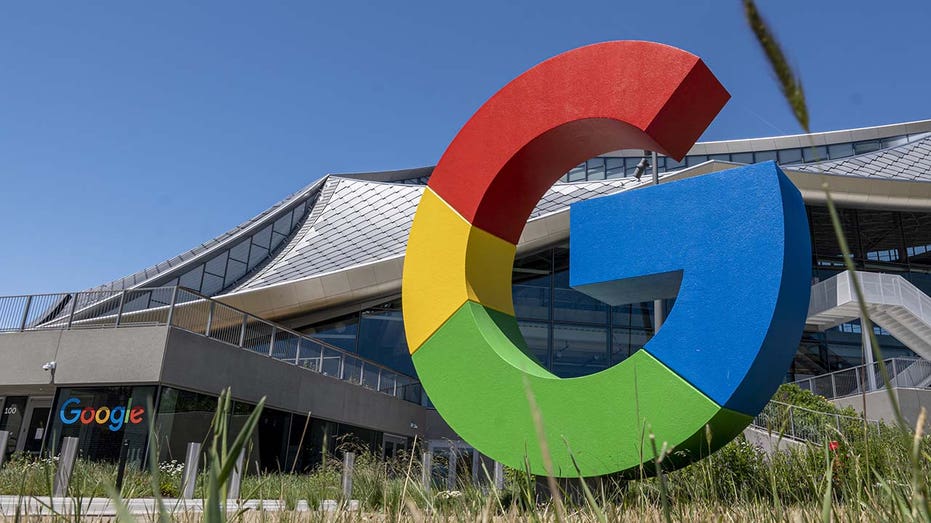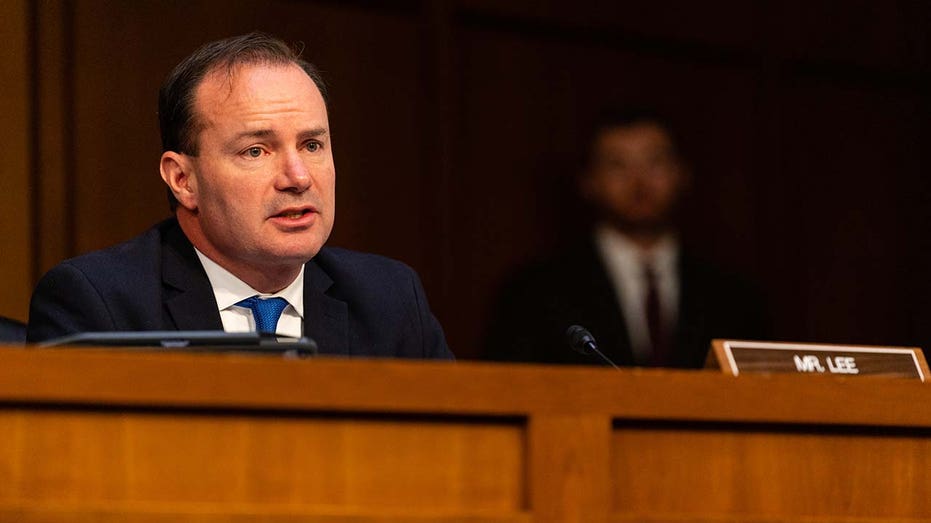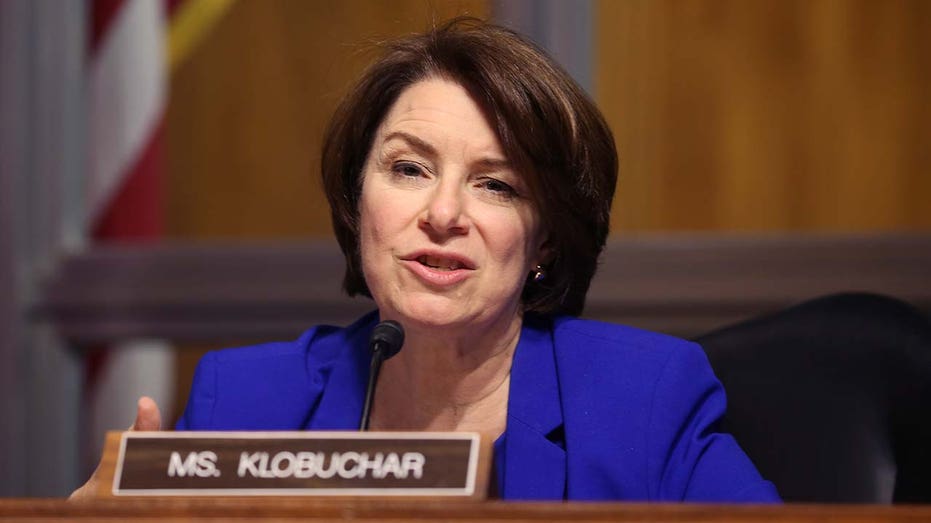[ad_1]
Sen. Marsha Blackburn, R-Tenn., on Instagram implementing new controls ahead of Capitol Hill hearing, cracking down on Big Tech, Biden’s meeting with Putin and the Military Defense Authorization Act.
A bipartisan group of senators led by Utah Republican Mike Lee introduced legislation Thursday that would take aim at conflicts of interest in the advertising technology industry and force Google to break up its dominant online-ad business.
The bill, co-sponsored by Sens. Ted Cruz (R., Texas), Amy Klobuchar (D., Minn.) and Richard Blumenthal (D., Conn.), is among the most aggressive of the legislative proposals circulating in Congress that aim to rein in the power of Big Tech.

Signage outside Google’s new Bay View campus in Mountain View, California, US, on Monday, May 16, 2022. (Photographer: David Paul Morris/Bloomberg via Getty Images / Getty Images)
| Ticker | Security | Last | Change | Change % |
|---|---|---|---|---|
| GOOG | ALPHABET INC. | 2,186.26 | -28.65 | -1.29% |
The Competition and Transparency in Digital Advertising Act would prohibit companies processing more than $20 billion in digital ad transactions annually from participating in more than one part of the digital advertising ecosystem.
That would directly impact Google, a unit of Alphabet Inc., which is the dominant player at every link in the chain that connects buyers and sellers of online advertising. Google operates tools that help companies sell and purchase ads, as well as the auction houses, or exchanges, where transactions happen in split seconds.
GOP PRIMARY VOTERS OVERWHELMINGLY WANT CONGRESS TO CRACK DOWN ON BIG TECH, SURVEY FINDS
Under the legislation, Google wouldn’t be able to stay in all those businesses.
Similar legislation is expected to be introduced in the House as soon as Thursday, led by Republican Ken Buck of Colorado and Democrat Pramila Jayapal of Washington, congressional aides said.
“When you have Google simultaneously serving as a seller and a buyer and running an exchange, that gives them an unfair, undue advantage in the marketplace, one that doesn’t necessarily reflect the value they are providing,” said Mr. Lee in an interview. “When a company can wear all these hats simultaneously, it can engage in conduct that harms everyone.”

Senator Mike Lee, a Republican from Utah, speaks during a Senate Judiciary Committee markup hearing on Monday, April 4, 2022. (Photographer: Eric Lee/Bloomberg via Getty Images / Getty Images)
In effect, the legislation would likely require Google to divest significant portions of the digital advertising business it built following its 2008 acquisition of DoubleClick Inc., Mr. Lee said. “It’s just a massive, massive business they’ve got going,” he said. Google’s “network” business, which includes tools used by third parties to buy and sell ads, generated $31.7 billion in revenue in 2021.
Companies would have a year from the enactment of the legislation to comply with the new rules.
DESANTIS LOOKS TO HOLD TWITTER BOARD ‘ACCOUNTABLE’ FOR RESPONSE TO MUSK’S BUYOUT BID
A Google spokeswoman said: “Advertising tools from Google and many competitors help American websites and apps fund their content, help businesses grow, and help protect users from privacy risks and misleading ads.”
The spokeswoman added: “Breaking those tools would hurt publishers and advertisers, lower ad quality, and create new privacy risks. And at a time of heightened inflation, it would handicap small businesses looking for easy and effective ways to grow online. The real issue is low-quality data brokers who threaten Americans’ privacy and flood them with spammy ads.”
If passed, the legislation would be the most significant change to antitrust law in a generation, antitrust experts said. It would amend the Clayton Act of 1914, one of the two laws that form the foundation of American antitrust law—and which hasn’t been amended since the 1970s.
While the Clayton Act and its predecessor, the Sherman Act of 1890, gave antitrust enforcers broad latitude to fight anticompetitive behavior, in recent decades they have been interpreted according to a narrow consumer-welfare standard that asks only whether the behavior raises prices for consumers, antitrust experts said. The rise of Big Tech, with its many free services and vast harvesting of personal data—as well as its fights over free speech—has challenged this consensus, and scrambled some of the traditional partisan postures toward reining in big business, they said.

Sen. Amy Klobuchar (D-MN) asks questions during a hearing of the Senate Judiciary Subcommittee on Privacy, Technology, and the Law, at the U.S. Capitol on April 27, 2021, in Washington, DC. (Photo by Tasos Katopodis-Pool/Getty Images / Getty Images)
The bill joins a crowded arena of legislation focused on the tech industry, and there is no guarantee it will advance or even get a vote. Another bill sponsored by Ms. Klobuchar, which would bar the largest tech companies from giving preference to their own products on their platforms, advanced out of committee earlier this year. Various attempts at privacy regulation have garnered some bipartisan support.
At its core, the bill sponsored by Mr. Lee borrows concepts from financial regulation and applies them to the market for electronically-traded, or “programmatic,” online advertising. These digital ads support most digital publishers and websites.
APPEALS COURT REINSTATES TEXAS LAW PROHIBITING SOCIAL MEDIA COMPANIES FROM BANNING USERS OVER POLITICAL VIEWS
The bill seeks to address some allegations that came to light in the antitrust lawsuit against Google filed in 2020 by more than a dozen state attorneys generals, led by Texas Attorney General Ken Paxton.
The complaint alleges that Google misled publishers and advertisers for years about the pricing and processes of its ad auctions, creating secret programs that deflated sales for some companies while increasing prices for buyers.
Court documents in the Texas-led suit quoted a Google employee comparing its advertising technology business to “if Goldman or Citibank owned the NYSE [New York Stock Exchange].”

A 3D printed Facebook’s new rebrand logo Meta and Facebook logo are placed on laptop keyboard in this illustration taken on November 2, 2021. (REUTERS/Dado Ruvic/Illustration/File Photo / | This article was produced in partnership with FOX Bet |)
| Ticker | Security | Last | Change | Change % |
|---|---|---|---|---|
| FB | META PLATFORMS INC. | 193.54 | +2.25 | +1.18% |
Meta Platforms Inc.’s Facebook would also likely be required to divest significant portions of its advertising business under Mr. Lee’s legislation, according to people familiar with the legislation. Facebook declined to comment.
The bill would also require smaller companies—those that process more than $5 billion in digital ad transactions annually—to follow new rules, including that they act in the best interests of their customers on every transaction and provide transparency about ad pricing.
GET FOX BUSINESS ON THE GO BY CLICKING HERE
If the bill became law, it would be enforced by the U.S. Department of Justice and state attorneys general. It would allow customers to sue ad tech giants for violations such as failing to be transparent or act in their best interest.
Mr. Lee said he supports the Texas suit, but he believes there is also a role for congressional action on such matters. “We could be waiting nearly a decade, and by then, a lot of the harm has been done,” he said.
[ad_2]
Source link
